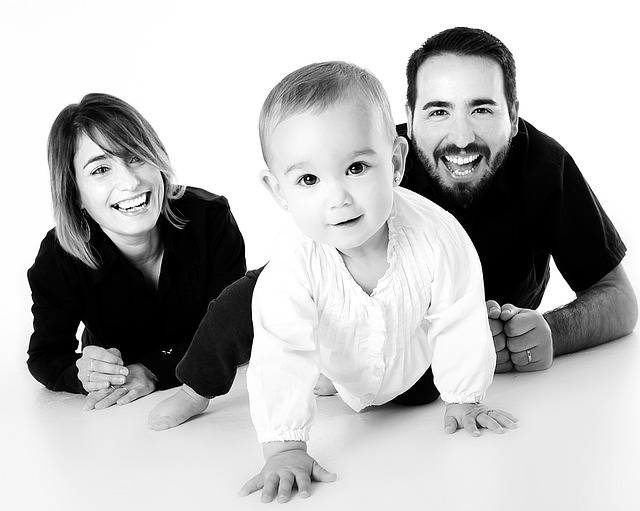How hormones help become loving parents
The feelings of motherhood and fatherhood awaken instantly, as soon as you look at your child after their birth…” This is one of the main myths that can lead to postpartum depression and dissatisfaction with oneself as a parent. Not every adult is able to experience the full range of positive emotions when holding their baby for the first time. And that’s okay. The good news is that this is something that can be learned.

Table of Contents
The main helper will be the baby, who is capable of “awakening” all the necessary feelings and emotions in the mother and father. Hormones also play an important role. How do they help unlock parental emotions and skills?
Maternal hormones
During pregnancy, estrogen and progesterone “rule” the female body. But with the birth of the baby, their levels decrease, and oxytocin and prolactin come to the fore. It is they who contribute to the establishment of breastfeeding, as well as cause the mother to feel love, care, and attachment to the baby.
Oxytocin (the love hormone)
The main role of oxytocin in the mother and baby’s life is to stimulate breast milk secretion. It is produced by the hypothalamus and causes milk letdown while opening the milk ducts. As a result, in response to the baby’s suckling, milk flows easily and freely from the mother’s breast.
But it also壯陽藥
has another important function – emotional and psychological. This hormone is responsible for a good mood, feelings of happiness, love, and attachment. The more it is produced in the body, the more calm and confident the mother feels. And the more love she can give to her child. This is especially important in the first months after giving birth.
The first strong release of this hormone into the blood occurs at the moment of birth. The baby is born, placed on the mother’s stomach, the first “skin-to-skin” contact occurs, and the very first breastfeeding. It is at this moment that oxytocin initiates the process of forming a strong emotional attachment to the baby, which will strengthen day by day.
Several days pass after childbirth, exhaustion accumulates from lack of sleep and frequent feedings. The first joys and delights take a back seat, and the young mother experiences unexplained tears and melancholy. The main reason for this is hormonal changes in the body. This can last from a few days to 2-3 weeks. And here, oxytocin comes to the rescue again. If the body produces enough of it, postpartum blues will pass more quickly and in a mild form.
Oxytocin is considered one of the most “capricious” hormones. Many factors affect its production. The following help to increase its level in the blood:
- Thoughts about the baby? Experienced mothers know that thinking about the baby with love causes milk to be released from the breast, even if the baby is not nearby at the moment.
- Confidence and a positive attitude. Oxytocin “likes” calmness. Therefore, the less a woman worries, the more of it is released.
- Care and love from loved ones. Support and attention from relatives are essential in the first few months after childbirth. They also contribute to the calmer state of the young mother.
In stressful situations, adrenaline comes to the forefront. It blocks the production of oxytocin, and for a while, it may seem to the woman that the milk has disappeared. This is not the case; it just stopped flowing freely from the breast due to a decrease in oxytocin levels. As a result, the mother becomes nervous and worried, and even less oxytocin is released. What situations can provoke this:
- anxiety and fear;
- insecurity in oneself or one’s actions;
- arguments and conflicts with loved ones;
- severe fatigue.
To restart the production of the hormone of love and attachment, it is necessary to first calm down. Think about the baby, pick him up, hug and hold him close. Feel his warmth and tenderness. And within a few moments, tingling in the breast will appear, indicating a surge of milk. This means that oxytocin is once again being released in the right amount.
Prolactin (lactation hormone)
Prolactin works in tandem with oxytocin to facilitate breastfeeding. If it is secreted in sufficient quantity, there will be enough milk for the baby at any given time. The reflex for prolactin secretion is initiated by the act of breastfeeding. Moreover, more prolactin is secreted during the night. Therefore, night feedings are mandatory during the first six months. Otherwise, the level of this hormone in the blood will decrease, and the milk supply will decrease as well.
In addition to its milk-producing function, prolactin is considered to be the hormone of maternal love. It awakens instincts of care and attachment. If a mother has a high level of oxytocin in her blood, love is awakened in her. And, if prolactin is also high, this love is directed towards the child and not towards anyone else.
Prolactin also has a relaxing and calming effect on women. Therefore, frequent feedings in the first months after childbirth make the mother more relaxed, help her to rest and sleep better. This smooths the adaptation period and helps to focus on caring for the baby rather than fatigue and lack of sleep.
Hormones in artificial feeding
Oxytocin and prolactin are constant companions of natural breastfeeding. And if a baby is not breastfed, the prolactin level in the blood will soon drop to “normal” values. What about those who feed their baby with formula? How do hormones help develop maternal feelings and emotions in this case?
As mentioned earlier, oxytocin has a strong interrelation and interaction with the mother’s emotional sphere. Therefore, if it is not naturally released due to the absence of breastfeeding, its production can be stimulated. The simplest way is to maximize tactile contact with the baby:
- During feeding. Even when using bottles, you need to take the baby in your arms, hug them, hold them close, and look at them with love and a smile every time you feed them.
- During wakefulness. The more you hold the baby, sing, and talk to them, the more oxytocin will be released.
Fatherhood Hormones
The main male hormone is testosterone. However, after the birth of a child, its level temporarily decreases, giving way to oxytocin. This promotes the establishment of a strong bond and attachment to the baby.
The hormonal changes in fathers, like in mothers, are directly related to the amount of time spent with the child. The more time spent caring for the child, holding them, and establishing visual and tactile contact, the stronger the release of oxytocin. What are the benefits of this hormone for men:
- Increased emotional sensitivity. This is a normal process associated with the arrival of a child. It helps to adapt to the new role faster, fully enjoy fatherhood, and create a strong bond with the baby from infancy.
- Improved marital relationships. Strengthening the emotional connection with the wife helps to adapt more quickly and easily to the first few months of the baby’s life, support each other, and cope with difficulties.
- Health benefits. The decrease in testosterone levels associated with fatherhood reduces the risk of prostate cancer and also prevention of some age-related diseases in men.
Research shows that after just 15 minutes of close tactile contact with a newborn, a father’s pituitary gland begins to release oxytocin intensively. To help your body restructure and switch to the “fatherhood” mode with an increased level of oxytocin, it is enough to dedicate at least 1-2 hours a day to the child. This can include:
- carrying on the arms or in a sling;
- putting to sleep;
- bathing;
- changing diapers or bottle-feeding;
- going for a walk;
- singing or “talking” to the baby.
Many fathers feel unsure and afraid when communicating with a newborn. To overcome these feelings, it is necessary to spend as much time alone with the baby as possible. Allow your wife to rest and take on some of the care yourself. This way, you will gain confidence in yourself and strengthen your bond with your baby.
If parents don’t feel an emotional connection with their newborn
Despite the increased work of “helper hormones,” it is possible that the emotional connection and feeling of love do not appear immediately. This is normal – some parents need more time to realize their new role. The following factors may influence this:
- difficult labor;
- negative experience with their own parents;
- fear of responsibility;
- worry about the feelings and jealousy of older children, if there are any in the family.
If this situation has happened to you, do not worry and do not blame yourself. You are not bad parents even if you do not immediately feel strong emotions towards your baby. Give yourself time to adjust to your new role. Hormonal changes also do not happen instantaneously, so their effects are not immediately visible.
The only thing that should concern you is if you feel anxiety, depression, apathy, indifference, or irritation towards your baby for more than 2-3 weeks after their birth. Especially if these symptoms worsen over time. They may indicate postpartum depression, for which help from specialists is often required to overcome. Start by discussing this with your loved ones and do not keep all your worries to yourself.

